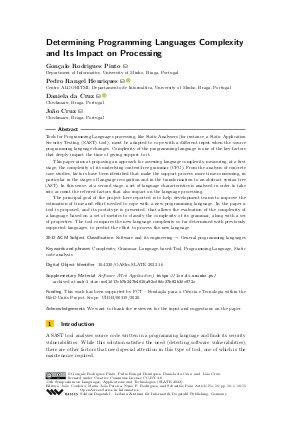Determining Programming Languages Complexity and Its Impact on Processing
Authors
Gonçalo Rodrigues Pinto,
Pedro Rangel Henriques  ,
Daniela da Cruz
,
Daniela da Cruz  ,
João Cruz
,
João Cruz
-
Part of:
Volume:
11th Symposium on Languages, Applications and Technologies (SLATE 2022)
Part of: Series: Open Access Series in Informatics (OASIcs)
Part of: Conference: Symposium on Languages, Applications and Technologies (SLATE) - License:
 Creative Commons Attribution 4.0 International license
Creative Commons Attribution 4.0 International license
- Publication Date: 2022-07-27
File

PDF
OASIcs.SLATE.2022.16.pdf
- Filesize: 0.78 MB
- 15 pages
Document Identifiers
Subject Classification
ACM Subject Classification
- Software and its engineering → General programming languages
Keywords
- Complexity
- Grammar
- Language-based-Tool
- Programming Language
- Static code analysis
Metrics
- Access Statistics
-
Total Accesses (updated on a weekly basis)
0Document
0Metadata
Abstract
Tools for Programming Languages processing, like Static Analysers (for instance, a Static Application Security Testing (SAST) tool), must be adapted to cope with a different input when the source programming language changes. Complexity of the programming language is one of the key factors that deeply impact the time of giving support to it. This paper aims at proposing an approach for assessing language complexity, measuring, at a first stage, the complexity of its underlying context-free grammar (CFG). From the analysis of concrete case studies, factors have been identified that make the support process more time-consuming, in particular in the stages of language recognition and in the transformation to an abstract syntax tree (AST). In this sense, at a second stage, a set of language characteristics is analysed in order to take into account the referred factors that also impact on the language processing. The principal goal of the project here reported is to help development teams to improve the estimation of time and effort needed to cope with a new programming language. In the paper a tool is proposed, and its prototype is presented, that allows the evaluation of the complexity of a language based on a set of metrics to classify the complexity of its grammar, along with a set of properties. The tool compares the new language complexity so far determined with previously supported languages, to predict the effort to process the new language.
Cite As Get BibTex
Gonçalo Rodrigues Pinto, Pedro Rangel Henriques, Daniela da Cruz, and João Cruz. Determining Programming Languages Complexity and Its Impact on Processing. In 11th Symposium on Languages, Applications and Technologies (SLATE 2022). Open Access Series in Informatics (OASIcs), Volume 104, pp. 16:1-16:15, Schloss Dagstuhl – Leibniz-Zentrum für Informatik (2022)
https://doi.org/10.4230/OASIcs.SLATE.2022.16
BibTex
@InProceedings{pinto_et_al:OASIcs.SLATE.2022.16,
author = {Pinto, Gon\c{c}alo Rodrigues and Henriques, Pedro Rangel and da Cruz, Daniela and Cruz, Jo\~{a}o},
title = {{Determining Programming Languages Complexity and Its Impact on Processing}},
booktitle = {11th Symposium on Languages, Applications and Technologies (SLATE 2022)},
pages = {16:1--16:15},
series = {Open Access Series in Informatics (OASIcs)},
ISBN = {978-3-95977-245-7},
ISSN = {2190-6807},
year = {2022},
volume = {104},
editor = {Cordeiro, Jo\~{a}o and Pereira, Maria Jo\~{a}o and Rodrigues, Nuno F. and Pais, Sebasti\~{a}o},
publisher = {Schloss Dagstuhl -- Leibniz-Zentrum f{\"u}r Informatik},
address = {Dagstuhl, Germany},
URL = {https://drops.dagstuhl.de/entities/document/10.4230/OASIcs.SLATE.2022.16},
URN = {urn:nbn:de:0030-drops-167620},
doi = {10.4230/OASIcs.SLATE.2022.16},
annote = {Keywords: Complexity, Grammar, Language-based-Tool, Programming Language, Static code analysis}
}
Author Details
- Centro ALGORITMI, Departamento de Informática, University of Minho, Braga, Portugal
Funding
This work has been supported by FCT – Fundação para a Ciência e Tecnologia within the R&D Units Project Scope: UIDB/00319/2020.
Acknowledgements
We want to thank the reviewers for the input and suggestions on the paper.
Supplementary Materials
-
Software (Web Application)
https://lce.di.uminho.pt/
browse
 archived version
archived version
References
-
Tiago L. Alves and Joost Visser. Metrication of sdf grammars. Technical report, Universidade do Minho, 2005.

-
Tiago L. Alves and Joost Visser. A case study in grammar engineering. In SLE, 2008.

-
Julien Cervelle, Matej Crepinsek, Rémi Forax, Tomaz Kosar, Marjan Mernik, and Gilles Roussel. On defining quality based grammar metrics. 2009 International Multiconference on Computer Science and Information Technology, pages 651-658, 2009.

-
Matej Crepinsek, Tomaz Kosar, Marjan Mernik, Julien Cervelle, Rémi Forax, and Gilles Roussel. On automata and language based grammar metrics. Comput. Sci. Inf. Syst., 7:309-329, 2010.

-
João Cruz. Qge - An attribute grammar based system to assess grammars quality. Master’s thesis, Universidade do Minho, December 2015.

-
Norman E. Fenton and Shari Lawrence Pfleeger. Software Metrics: A Rigorous and Practical Approach. Boston : PWS Publishing Company, 2 edition, 1997. ISBN: 0-534-95425-1.

-
Pedro Rangel Henriques. Brincando às linguagens com rigor: Engenharia gramatical. Technical report, Departamento de Informática da Escola de Engenharia da Universidade do Minho, November 2013.

-
Terence John Parr. Language Implementation Patterns: Create Your Own Domain-Specific and General Programming Languages. The Pragmatic Bookshelf, 2009. ISBN: 978-1-934356-45-6.

-
J.F. Power and Brian A. Malloy. Metric-based analysis of context-free grammars. Proceedings IWPC 2000. 8th International Workshop on Program Comprehension, pages 171-178, 2000.

-
J.F. Power and Brian A. Malloy. A metrics suite for grammar-based software. J. Softw. Maintenance Res. Pract., 16:405-426, 2004.

